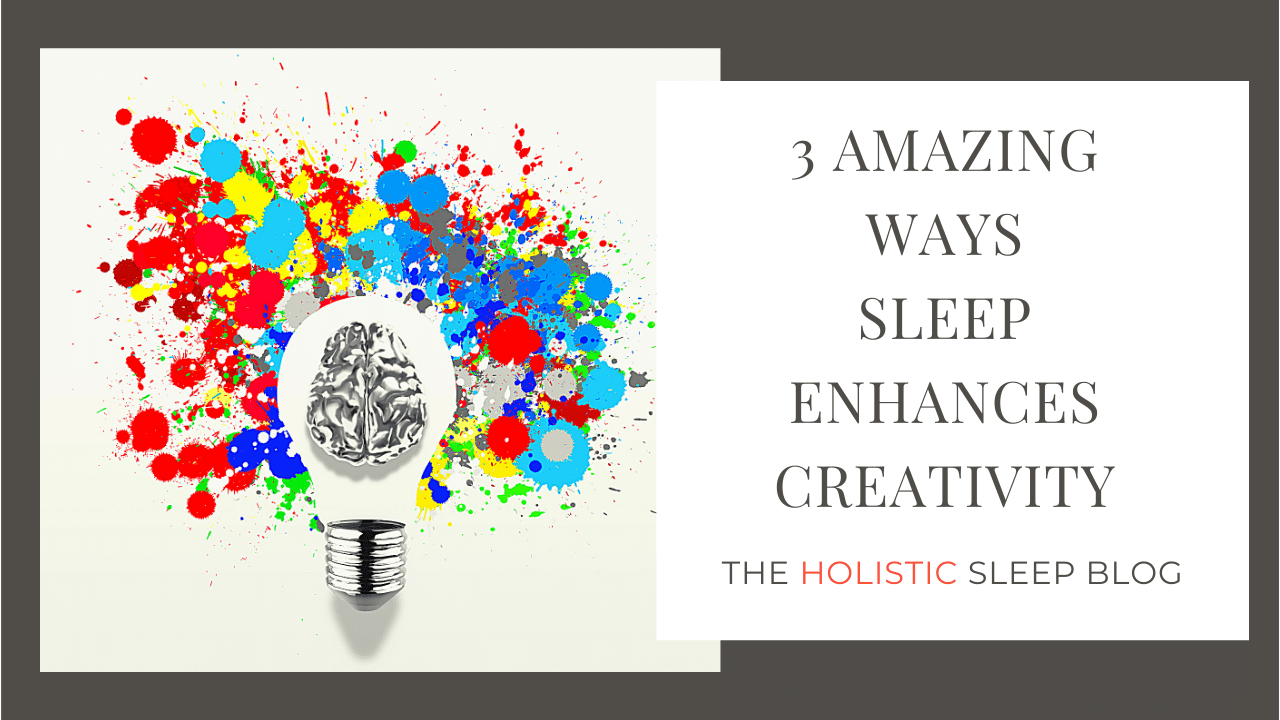3 Amazing Ways Sleep Enhances Creativity

“Why don’t you sleep on it, dear.”
~ Grandma
Our elders were on to something when they told us to sleep on it before making any big decisions or solving any big problems.
But why does it help?
For starters, it seems that, to some degree, sleep enhances creativity. A formal definition of creativity remains somewhat illusive but I’m partial to this explanation:
“Creativity is being able to put together two different ideas, not just in a new way, but in an interesting, important, and useful way.” Dr. Sara Mednick, assistant professor at University of California
The ability to connect what we already know with something we just learned requires the brain to make a creative leap.
Whatever kind of creativeness you desire, it’s likely you’ll find creative solutions to life’s difficult problems after periods of sleep. Here’s why:
1. Sleep Facilitates Insight
"A-ha" moments are sudden realizations that expand our understanding of the world and ourselves. These Eureka! moments are the fuel for personal growth and practical advantage.
During sleep, a whole lot of mental restructuring occurs. Anecdotally, we’ve known for years that creative insights occur during sleep but now science suggests the same. This study concludes that sleep, by restructuring new memory representations, facilitates explicit knowledge and insightful behavior.
2. Sleep Creates and Consolidates Memories
Sleep and memory are deeply connected.
During both REM and non-REM sleep, the brain is busy forming new memories, consolidating older ones, and linking the two. Memories get solidified and strengthened as we sleep. Research confirms what some sleep experts have long theorized: sleep is critical for firming up learning that takes place during the day—cementing new information so to speak.
This process likely explains why spacing out studying across several days is more effective than cramming it all into one day. When you space out your learning, you’re building on already-consolidated knowledge and memories.
When we sleep, our brains reorganize and declutter connections between brain cells to strengthen relevant memories. The exact mechanisms for this process are still unknown (like so many mechanisms involved with sleep!).
Neuroplasticity, the brain’s ability to forge new pathways and make new connections between neurons, also relies heavily on sleep. During sleep, we’re learning and unlearning all the time. This fosters “creative associations,” or unusual connections in the brain. (Which could lead to one of those “a-ha” moments upon waking).
Upon waking from sleep, you are 33 percent more likely to make connections between seemingly distant ideas.
Since creative thought relies on the reorganization of existing knowledge, and the assimilation of new knowledge, it’s clear that sleep helps us integrate memories and gain a bigger picture of things.
3. Dreams Awaken Creativity
However nonsensical they may seem, dreams play an integral role in enhancing creativity. Many artists, musicians, and writers glean creative inspiration from their dreams.
During sleep, brain activity is high in areas associated with imagery, so problems requiring vivid visualization are more likely to get help from dreaming.
Dreaming is essentially our brain thinking in another neurophysiologic state – thereby making it easier to solve problems in ways our waking mind might get stuck.
When you’re sleeping, the restrictions of reality fall away and your brain gets to let loose. Free from the usual sensations, the brain can, quite frankly, go crazy. That freedom allows the brain to experiment and make new associations.
Dreams often don’t make sense because the brain is trying to fit new ideas with old ideas. It’s why dreams are so novel and creative. Unbound by conscious rationalization, the brain creates incongruencies in fascinating ways.
Create the Things You Wish Existed
Creativity is something that is a part of everyone. It’s a truly crucial part of human development and life. We can think of sleep as a creative learning process that allows us to extrapolate and look for novel juxtaposition of events.
When you’re trying to develop a creative solution to a difficult problem, you need to tap into some knowledge that you already have that will help you take a new approach. A big part of creativity is allowing the problem to remind you of things that are relevant to the problem.
Kind of like finding a good analogy.
When you sleep, the events that you’re exposed to during the day are solidified into memory. The memories, however, don’t hold every detail of the event. So, after you sleep, your memory of the problem you’re trying to solve will hold fewer details and more essential elements. When you come back to a problem after sleeping, your description of the problem changes because your brain retrieves different information from memory than it did before sleep.
You’ll be much more likely to find an analogy for a problem after you’ve slept on it than you were before.
"Creativity is the power to connect the seemingly unconnected."
~ William Plomer
Supporting you in all things sleep,

Beth Kendall MA, FNTP
Holistic Sleep Coach
Health Disclaimer: The information and other content provided in this blog, or in any linked materials, are not intended and should not be construed as medical advice, nor is the information a substitute for professional medical expertise or treatment.
Tired of doing everything imaginable and getting nowhere with your sleep?
Get my FREE EMAIL COURSE and learn:
- Why there's no mystery to insomnia
- The most important thing to know about sleep
- Why sleep hygiene doesn't work
-How to create a "sleeper's identity"
- The ONE (and only) thing you need to sleep
-Why most sleep programs miss the mark
- The biggest myths about sleep
- How to end insomnia for good
I take the guesswork out of insomnia so you don't have to figure it out anymore.
Enter your name and best email to start right NOW.



